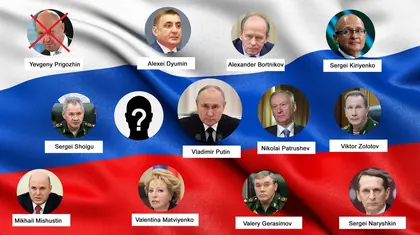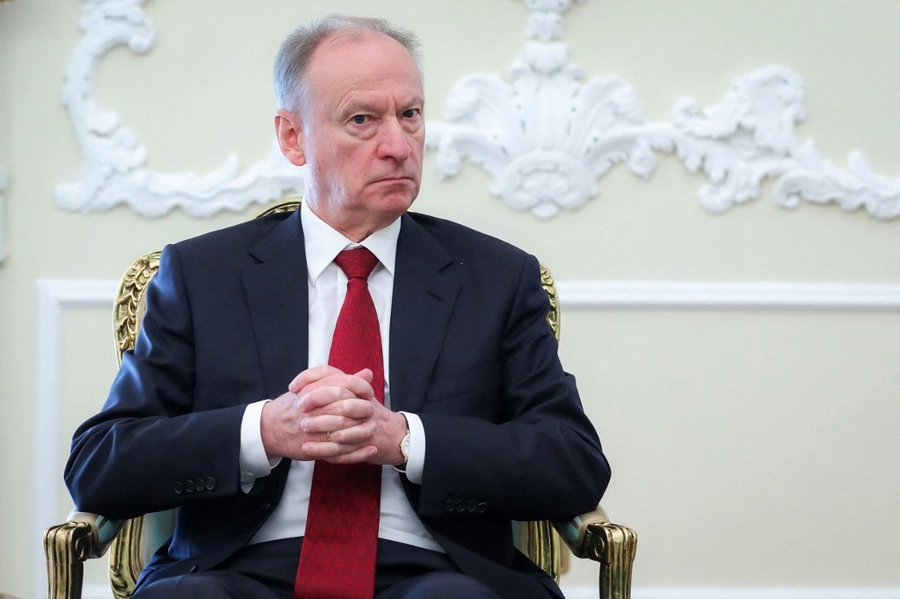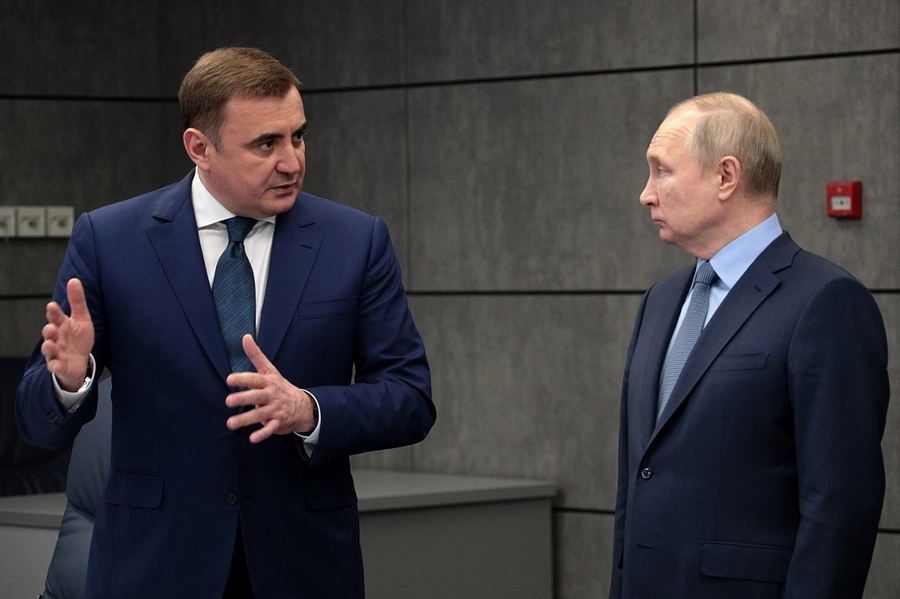Endless rumors about Russian President Vladimir Putin’s health have intensified speculation among experts that his quarter-of-a-century rule could be close to an end.
Whilst there may be no shortage of those wanting to replace him, none has yet emerged as a clear front runner.
JOIN US ON TELEGRAM
Follow our coverage of the war on the @Kyivpost_official.
It has been Putin’s strategy all along to “divide and rule,” ensuring no risk of a “palace revolution” to threaten him; furthermore, he has not named a preferred successor, at least not publicly.
Kyiv Post examines some of the likely and less-likely candidates to succeed Putin.
Mikhail Mishustin
The Russian constitution would make Mishustin, the current prime minister, the forerunner if Putin should suddenly become “incapacitated” as article 92.3 makes him next in line.
However, his public profile in Russia is virtually non-existent outside of Moscow.
Mishustin has repeatedly stated he has no desire for the top job but is seen, not least by himself, as being a safe pair of hands to support the leadership in times of crisis. When head of Russia’s tax service, he was credited with reforming the country’s monetary system and has, reportedly, been largely instrumental in setting up methods to minimize the economic effects of Western sanctions.
Syracuse University’s professor Brian Taylor told Newsweek in 2022 that “the case for Mishustin is that he would be the path of least resistance if Putin was suddenly out of office.”

Trump’s Russia Plan – Will It Work? NATO, Putin & US Strategy Explained
Yuri Zhukov, an associate professor at the University of Michigan said this was exactly how “Putin rose to power in 1999, following Boris Yeltsin's resignation.”
Nikolai Patrushev
Another former Federal Security Service (FSB)/KGB spy, now secretary of the Russian Security Council, shares (some say helped form) Putin’s worldview and is rabidly anti-US. He likely knows where “the skeletons are buried” in respect of his competition.
The Washington Post also quoted Zhukov, who agreed that Patrushev could be a potential successor, saying: “There could be multiple rival clans vying for power. At the top of the pecking order is a clan of elites from the security services like Patrushev, and… Sergey Naryshkin.”
Nikolai Patrushev on November 9, 2022.IRANIAN PRESIDENCY / AFP
However, age could be against Patrushev, who is in fact two years older than Putin. So at best he would likely be a transitional figure, but one who is likely to pursue the war in Ukraine with more vigor and aggression.
Sergei Shoigu
The current minister of defense has proved himself to be a shrewd political operator and survivor who one might think would have the support of Russia’s armed forces.
However, he has been blamed for much of the military disaster that the war with Ukraine has become, not least by former Wagner Head Yevgeny Prigozhin and a host of ultra-nationalists and pro-war bloggers.
Putin’s ruling style has necessitated someone else being to blame when things go wrong, and Shoigu has admirably filled those shoes. The fact that Shoigu has no direct military experience has almost certainly made that easier. He’s unlikely to get the top spot but his survivability will likely guarantee a place at the top table in some capacity.
Mark Galeotti commented, in an article in British newspaper The Independent: “Before the invasion, I would have absolutely said Shoigu, but his reputation has now been tarnished.”
Dmitry Medvedev
Putin’s trusted sidekick and supporter for the best part of 20 years, Medvedev has conspired to keep Putin in power with the presidential/prime minister sleight of hand. He served for a total of 12 years as prime minister before becoming deputy chairman of the Security Council in 2020.
Since the start of Putin’s war in Ukraine, Medvedev has attempted to portray himself as the most savage of hawks, much to the amusement of readers of his frequent maniacal outbursts and threats of nuclear Armageddon made on his Telegram channel.
At 57, Medvedev is about the right age to take over and many Russians respond well to Medvedev’s extremism that has helped convince millions of Russians that the Kremlin knows what it’s doing in Ukraine.
According to the Foreign Policy website, sadly (for him) it is likely that Moscow’s political elite see him as an ineffectual “Vladimir-lite” who is unlikely to garner enough support without Putin behind him.
Alexei Dyumin
Analysis by the Insikt research group identify Dyumin as a possible successor to Putin, drawing parallels between how they both emerged from relative obscurity.
Putin’s former bodyguard and a special forces commander during the 2014 annexation of Crimea was appointed to the post of governor of the Tula region south of Moscow two years later. Some observers see him as 100 percent loyal to the current president and groomed as an heir apparent, with much having been made of him as a military strong man.
It has been noticeable that he has managed to steer clear of internal Kremlin politicking. Many see parallels with how the relatively obscure Putin suddenly leapt to power after being hand-picked by former Russian President Boris Yeltsin.
However, being seen as a Putin favorite could make Dyumin vulnerable should there be a power struggle within the Kremlin rather than an orderly transition.
Alexei Dyumin and Vladimir Putin on December 23, 2022. SPUTNIK / AFP
Sergei Kiriyenko
Sixty-year-old Kiriyenko was made first deputy chief of staff in 2016 and is seen as a jack-of-all-trades. He was entrusted by Putin to manage the bogus referenda in the occupied regions of Ukraine, and was once seen as a liberal reformer while serving as Yeltsin’s prime minister, to whom he advised the appointment of Putin as head of the FSB.
Kiriyenko is a member of the Kremlin inner circle, who has almost daily access to the president but is likely to suffer from in-fighting because of that relationship. This leads political commentator, Mark Galeotti, to dismiss his chances of getting the top job, thinking him better suited as a “backroom” operator.
Alexander Bortnikov
Bortnikov has been head of the FSB for 14 years during which time he has been credited with having turned his service into a state within a state and acting as Putin’s loyal aide and brutal hatchet man when it came to dealing with Russia’s political opposition. Some say that he epitomizes the view that Russia has become a security service with a nation attached.
Filip Kovačević, a professor in the Departments of Politics and International Studies at the University of San Francisco, described Bortnikov as “both the brain and the heart of the Putin regime.”
That said, many feel that Putin may have lost confidence in his colleague from St Petersburg after Bortnikov and his FSB provided the inaccurate intelligence assessments that Ukrainians would welcome Russia’s full-scale invasion as “freeing” them from Kyiv’s fascists and terrorists.
Viktor Zolotov
Zolotov is a creation of the Kremlin, having spent most of his career there, starting as a bodyguard to President Yeltsin in 1991. He had the same role under Putin before being made head of the newly created National Guard in 2016.
Described by observers as “grey and sullen,” Zolotov was the only member of the military that came out of the aftermath of the “Prigozhin mutiny” with any credit, being told by the president that “you saved the Motherland from turmoil, and effectively stopped a civil war.”
Seen by many as the consummate loyalist, Zolotov and his troops will soon receive an arsenal of advanced weaponry, including tanks and artillery, to guard against similar threats to the regime.
His rivals in the Russian military have been humiliated by the fiasco and may hold that against Zolotov post-Putin according to a June 27 article in Time magazine.
Valentina Matviyenko
Included in the list of possibles primarily because of her St. Petersburg background, the Ukrainian born politician and diplomat has seen her career progress very much as a result of Putin’s patronage. She began her political career in 1980s Leningrad (now St Petersburg) then filled a number of communist party roles before being an ambassador to Malta and Greece in the 1990s.
Valentina Matviyenko on October 25, 2023. Russia's Federation Council / AFP
By the early 2000s she was firmly allied with Putin, an alliance which secured her victory as governor of St Petersburg in 2003, before being made a senator and chairperson of Russia’s Federation Council since 2011.
A Carnegie Endowment article in early 2023 suggested that Matviyenko had been slapped down publicly by the Kremlin spokesman Dmitriy Peskov for acting unilaterally in areas that did not concern her.
Sergei Naryshkin
Sergei Naryshkin has served as the director of the Foreign Intelligence Service since 2016. Another Putin loyalist, he dismissed reports of a possible invasion of Ukraine as “malicious propaganda by the US State Department,” in November 2021, just three months before the full-scale invasion was launched.
Used to working behind the scenes, Naryshkin came to prominence only days before the invasion when he was described as being “visibly trembling and stuttering uncomfortably” as Putin publicly humiliated him for “his fumbling” response to the televised meeting to recognize the Russian-backed separatist regions of Donetsk and Luhansk.
Since that dressing down, Naryshkin has firmly followed Putin’s lead, particularly in his attacks on the West with statements such as a speech made to a security conference in August, where he stated “as a spiritually and physically healthy person, it’s unpleasant and sometimes even scary to travel to Europe – so many perversions of various kinds have thrived there,” as quoted by the Middle East Research Institute.
Valery Gerasimov
The chief of the General Staff of the Russian Armed Forces and first deputy minister of defense was appointed by Putin in November 2012. He is currently serving as the commander of all Russian forces committed to the war in Ukraine.
Once seen along with his boss, Shoigu, as a potential future president, he has seen his star lose much of its luster after his continuing failure to reverse the losses in the war.
Other contenders
Unlike other dictators throughout history, Putin’s family members are seemingly not being groomed to replace him. In fact, the opposite appears to be the case. Putin takes great pains to keep them in the background with very few details known about their relationship with the president.
Other possible contenders mentioned by analysists include Moscow’s mayor Sergei Sobyanin, First Deputy Prime Minister Andrei Belousov, and Marat Khusnullin, Russia’s deputy prime minister for construction and regional development.
It is of course completely possible that a total unknown could step into Putin’s shoes.
According to Russian-born writer Niko Vorobyov: “The best we can hope for is a pragmatic kleptocrat who appreciates that the war is bad for business and thus would have very self-interested reasons to scale back the current confrontation.”
You can also highlight the text and press Ctrl + Enter













